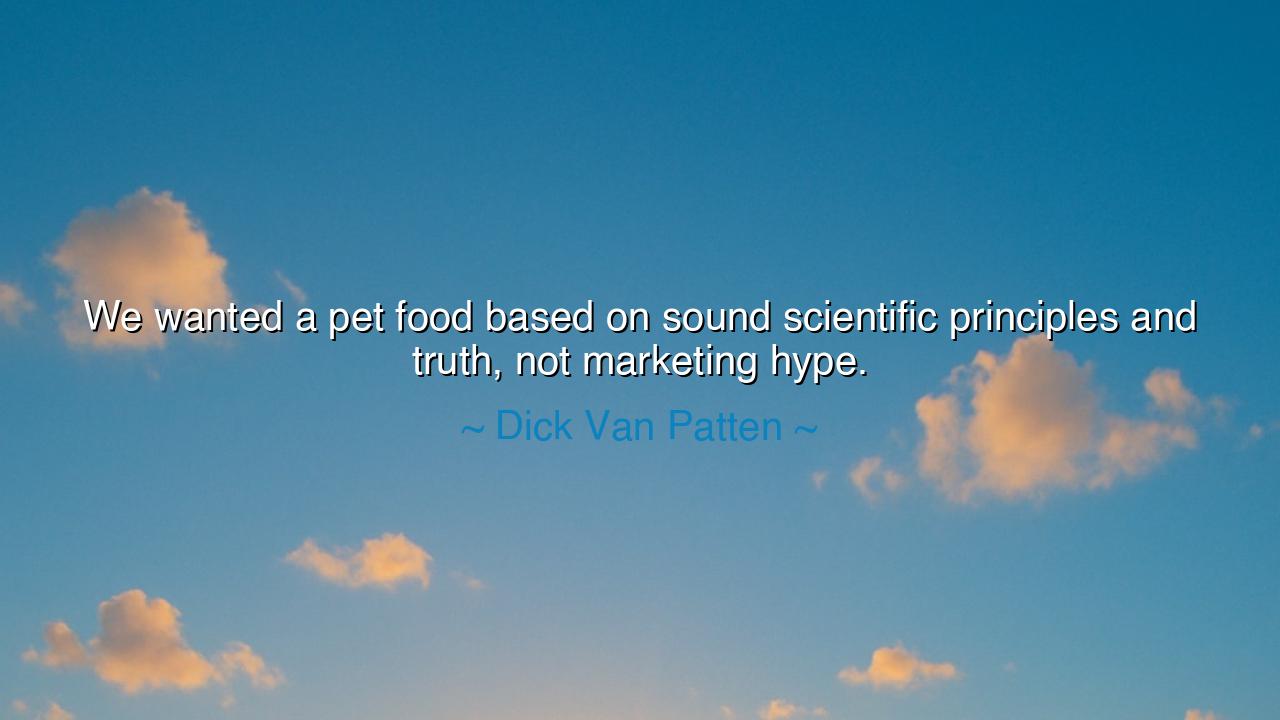
We wanted a pet food based on sound scientific principles and
We wanted a pet food based on sound scientific principles and truth, not marketing hype.






In the words of Dick Van Patten: “We wanted a pet food based on sound scientific principles and truth, not marketing hype.” At first, these words may seem a matter of commerce, of food for animals. Yet beneath them lies a greater wisdom: the call to build life’s labors upon the bedrock of truth rather than the glitter of illusion. For Van Patten, the nourishment of beloved companions was not to be entrusted to empty promises or shallow slogans, but to principles rooted in science, honesty, and integrity.
The origin of this quote springs from Van Patten’s creation of Natural Balance Pet Foods, born of a vision to give animals sustenance as pure as the devotion they give to their masters. Too long had the industry thrived on packaging and persuasion, dazzling the eye with labels while hiding mediocrity within. Van Patten rebelled against this, choosing instead to anchor his work in that which endures: knowledge tested, principles proven, and honesty displayed. His words reflect the timeless truth that all endeavors, whether in food, art, or life, must distinguish between what is real and what is hollow.
The ancients themselves taught this lesson. Consider the physician Hippocrates, who healed not with superstition but by observing nature’s laws, setting aside the false charms of quackery. His oath, sworn by generations of healers, bound them to truth above pretense, to care above profit. In the same way, Van Patten sought to bind his work to the health of creatures, refusing to clothe deception in fine garments. Both men show us the eternal struggle: truth requires courage, for falsehood is always easier and more pleasing to the crowd.
There is also in these words a rebuke of marketing hype—the gaudy mask that commerce wears to win the hearts of the unwary. History is filled with such masks. In Rome, emperors staged bread and circuses to distract the people from corruption, feeding them illusion while starving them of justice. In our age, bright labels and clever words perform the same deceit. Yet Van Patten reminds us that beneath every mask must lie reality, and only when reality is good can the mask endure. For illusions always perish in the fire of time, while truth survives every storm.
But Van Patten’s vision was not only practical; it was born of love. A man who loved animals sought not merely to sell to their owners but to care for the creatures themselves. This is the deeper meaning: when our labors are driven by genuine devotion, we will naturally seek truth over deception. To love is to be unwilling to feed another being lies, whether in food or in words. His words therefore carry a moral force, teaching us that truth is not only a matter of reason, but of compassion.
The lesson for us is clear: build your life on principles, not illusions. Whether you are creating food, art, business, or relationships, let your foundation be honesty and proven truth, not the fragile glamour of appearances. The world will always tempt you with shortcuts and masks, but those who endure are those who choose substance. Just as animals flourish when fed with integrity, so too will human souls flourish when they are nourished with honesty and wisdom.
In practice, this means testing what you trust, seeking knowledge before embracing claims, and refusing to be seduced by glitter without substance. Let your words be as nourishing as food, your actions as reliable as science, your promises as strong as truth. And when you labor, let it be not only for profit but for the good of others, for love that stretches beyond yourself.
Thus, Dick Van Patten’s words, though spoken of pet food, echo the eternal teachings of the ancients: truth is stronger than illusion, and love is nobler than gain. Build always upon the rock of honesty, for the house built on sand will fall, but the one built on truth will stand through every storm. And let this be the lesson passed down: whatever you create, let it be worthy of the trust of those who depend on it—whether beast or man, whether now or for generations to come.






AAdministratorAdministrator
Welcome, honored guests. Please leave a comment, we will respond soon